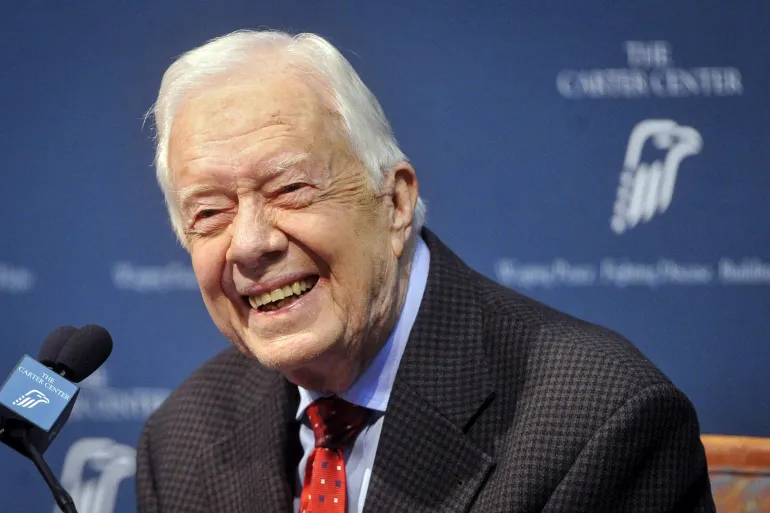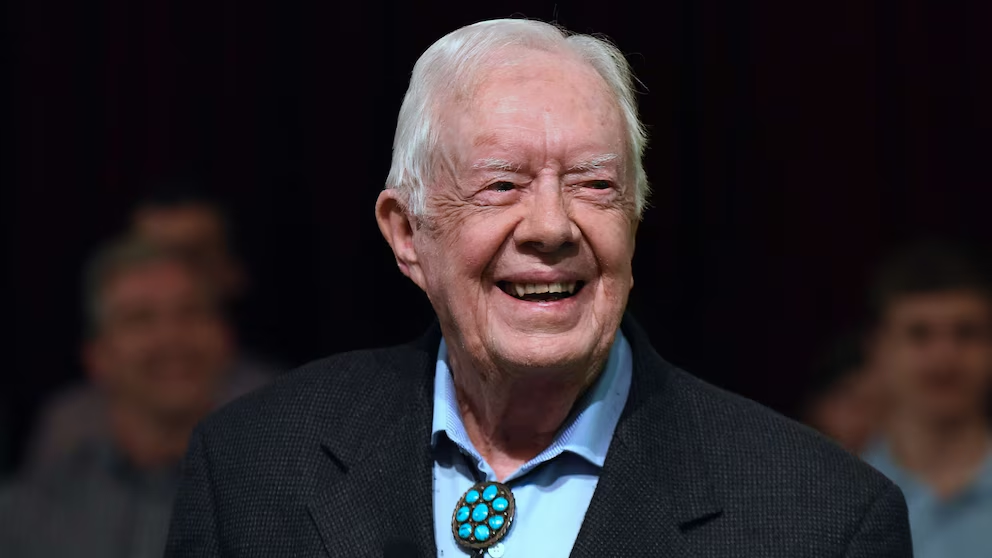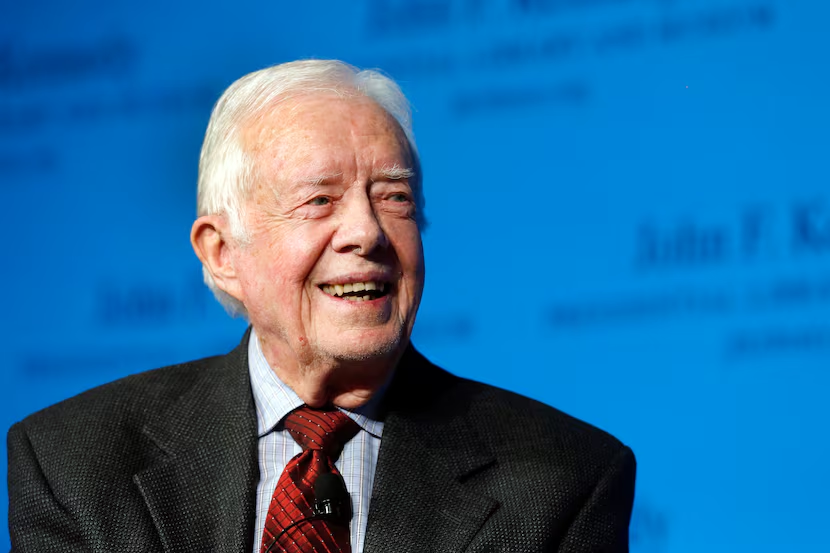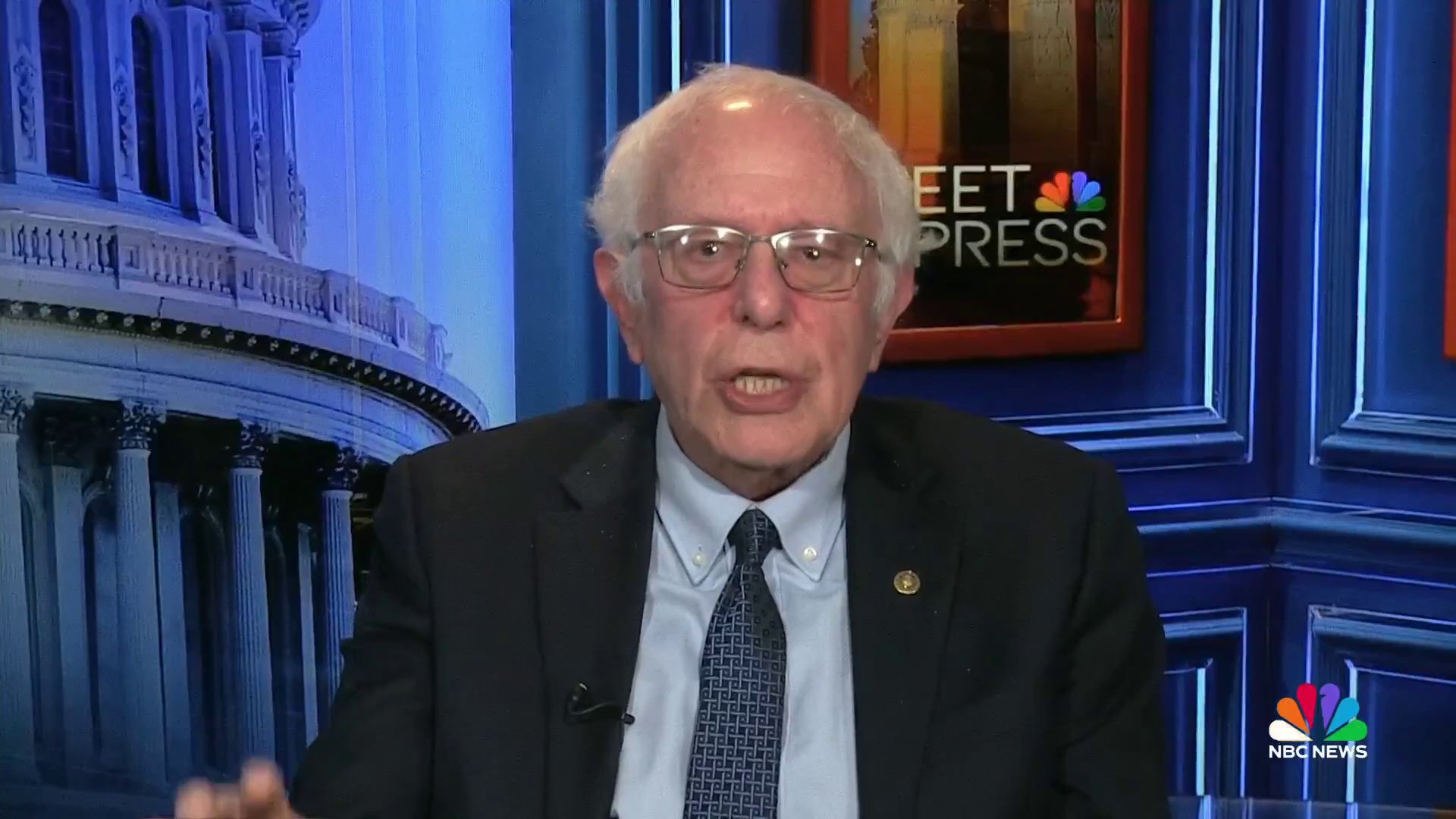
James Earl Carter Jr., better known as Jimmy Carter, served as the 39th president of the United States from 1977 to 1981. As a former U.S. president, Nobel Peace Prize laureate, humanitarian, and influential figure, Carter’s life and work have left a profound impact both domestically and globally. In this article, we’ll explore Jimmy Carter’s presidency, his post-presidential contributions, and his legacy.
Early Life and Background Jimmy Carter was born on October 1, 1924, in Plains, Georgia, into a farming family. Raised in a small town, he experienced the challenges and triumphs of rural America during the Great Depression. His father, James Earl Carter Sr., was a successful farmer, while his mother, Lillian, was a registered nurse. Carter’s upbringing instilled in him values of hard work, empathy, and service to others.
Carter attended the United States Naval Academy in Annapolis, Maryland, where he graduated in 1946. His early career in the U.S. Navy, particularly his service on submarines, provided him with valuable leadership experience. However, his life took a pivotal turn in the 1950s when he returned to Georgia to take over the family farm.
Carter’s Political Rise Jimmy Carter’s political career began in 1962 when he was elected to the Georgia State Senate. His conservative but progressive stance on issues quickly earned him recognition. He served as governor of Georgia from 1971 to 1975, where he made significant strides in education reform, environmental protection, and racial integration. Carter’s time as governor was a training ground for his presidential run, showcasing his ability to bring about real change while fostering relationships across party lines.
In 1976, Carter ran for the presidency as a political outsider. He capitalized on the public’s disillusionment with the political establishment, particularly after the Watergate scandal. Running as a reformist, Carter won the Democratic nomination and ultimately defeated incumbent President Gerald Ford in a close election. His victory represented a shift toward a more ethical and transparent government.
The Presidency of Jimmy Carter As president, Carter faced numerous challenges, both domestically and abroad. Despite his idealism and commitment to human rights, his presidency was marked by significant economic difficulties, including stagflation (a combination of inflation and unemployment) and an energy crisis. However, Carter did make important strides in foreign policy, particularly with the Camp David Accords.
Key Achievements and Policies:

- The Camp David Accords (1978) – One of Carter’s most significant achievements was brokering a peace agreement between Israel and Egypt, leading to the Camp David Accords. This historic agreement ended a 30-year state of war between the two nations, earning Carter the Nobel Peace Prize in 2002.
- Human Rights Advocacy – Carter made human rights a central component of U.S. foreign policy, promoting the idea that the U.S. should support governments that upheld democratic values. This approach led to the normalization of relations with China and increased pressure on oppressive regimes in Latin America and Africa.
- Energy Crisis and Environmental Policies – In response to the oil embargo of 1973, Carter worked to create an energy policy aimed at reducing U.S. dependency on foreign oil. He established the Department of Energy and promoted alternative energy sources, though his policies on this front were met with mixed success.
- The Iran Hostage Crisis (1979-1981) – One of the darkest moments of Carter’s presidency was the Iran Hostage Crisis. Following the Iranian Revolution, 52 American diplomats and citizens were taken hostage by Iranian militants. Despite intense diplomatic efforts, Carter was unable to secure their release before leaving office.
Post-Presidency: Humanitarian Work and Global Impact After his presidency, Jimmy Carter remained highly active in global and humanitarian causes. His post-presidential years have been defined by his commitment to peacebuilding, public health, and democracy.

- Carter Center – In 1982, Jimmy and his wife Rosalynn founded the Carter Center, a non-profit organization aimed at advancing human rights, fighting disease, and promoting peace. The Carter Center has worked to eradicate diseases like Guinea worm disease, improve access to clean water, and facilitate democratic elections in developing countries.
- Global Health and Peace Initiatives – Through the Carter Center, Carter became a tireless advocate for global health. His work on disease eradication, particularly his efforts to combat malaria and neglected tropical diseases, earned him international acclaim. Carter’s dedication to these causes has solidified his reputation as a global humanitarian.
- Nobel Peace Prize – In 2002, Carter was awarded the Nobel Peace Prize for his decades of work in promoting peace, democracy, and human rights. The award recognized his efforts in diplomacy, conflict resolution, and his leadership in humanitarian work.
Challenges and Criticism

While Carter is widely praised for his dedication to human rights and diplomacy, his presidency faced significant challenges, many of which overshadowed his accomplishments. The Iran Hostage Crisis, the Soviet invasion of Afghanistan, and economic issues like high inflation and unemployment led some to view his presidency as less successful.
His handling of the Iranian Revolution and the inability to free the hostages became a defining issue in the 1980 presidential election, in which Carter was defeated by Ronald Reagan. Despite this, Carter’s post-presidential work has rehabilitated his public image, showing that his legacy extends far beyond his time in office.
Frequently Asked Questions (FAQs)
What were Jimmy Carter’s most significant achievements as president?
Jimmy Carter’s most notable achievements include the Camp David Accords, which facilitated peace between Egypt and Israel, his focus on human rights in foreign policy, and his efforts to address the energy crisis and environmental concerns.
Why did Jimmy Carter lose the 1980 election?
Carter’s loss in the 1980 election was largely due to the Iran Hostage Crisis, economic challenges like stagflation, and his inability to restore the nation’s confidence during times of crisis. His challenger, Ronald Reagan, offered a stark contrast with promises of economic revival and a strong military stance.
What is the Carter Center?
The Carter Center is a non-profit organization founded by Jimmy and Rosalynn Carter that works on global health issues, disease eradication, promoting human rights, and fostering peace through diplomacy and conflict resolution.
Did Jimmy Carter ever win a Nobel Peace Prize?
Yes, Jimmy Carter was awarded the Nobel Peace Prize in 2002 for his work in promoting peace, democracy, and human rights through the Carter Center and his other humanitarian efforts.
What is Jimmy Carter doing now?
As of 2025, Jimmy Carter remains an active advocate for global peace and health initiatives. He continues his work with the Carter Center and remains a respected voice on issues of human rights, diplomacy, and public service.
Conclusion
Though his presidency may not have been free of controversy and challenges, Jimmy Carter’s impact on global health, human rights, and peace is undeniable. His dedication to service, both in and out of office, has solidified his place in history as one of America’s most admired former presidents. His post-presidential years have only enhanced his legacy, with countless lives touched through his work at the Carter Center and his advocacy for the world’s most vulnerable communities.
By combining diplomacy, humanitarianism, and a relentless drive for peace, Jimmy Carter’s life story continues to inspire generations around the globe. His example shows that leadership does not end with the presidency it extends into the broader world where true service and compassion can create lasting change.








